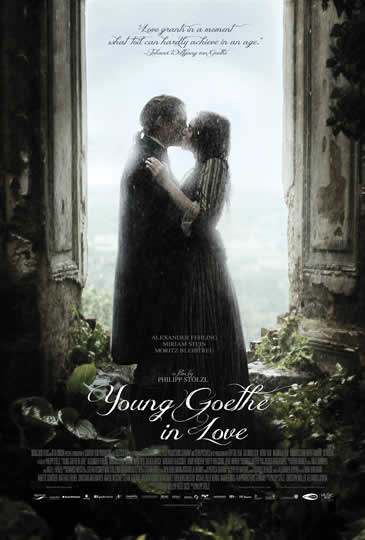Philipp Stölzl’s engaging “Young Goethe in Love” is a treat from the first bars of Ingo L. Frenzel)’s brisk neo-period score. Stölzl, who directed the alpine drama “Northface”, is equally adept helming a romantic romp, a romanticized bio-pic about Johann Wolfgang Goethe, the poster boy for German Romanticism and Sturm und Drang.
Bad-boy Goethe (Alexander Fehling-“If Not Us, Who?”) flubs his Bar Exam orals. His father (Henry Huebchen) a noted Judge, enraged about Goethe’s time -wasting poetry, packs him off to provincial town of Wetzlar. The stern prosecutor Kestner (Moritz Bleibtreu-“The Baader Meinhof-Complex”) takes one look at Goethe’s records and turns down hia application as legal clerk to the county court, but a quick word in his ear from his superiors, reminding him just ‘who’ Goethe’s father is, and Goethe is accepted. His workmate, and soon best friend, Wilhelm Jerusalem (Volker Bruch) takes constant bullying from the other up-and coming clerks, no doubt because he is Jewish. Goethe and Wilhelm go carousing, and are given double duty by Kestner as punishment. Soon Goethe distinguishes himself as Kestner’s favorite clerk.
The boys crash a local poetry salon. Goethe meets the prickly, artistic Lotte Buff (Miriam Stein). Lotte spars with Goethe, which grabs his attention. She’s an avid theatre and opera buff. Lotte and Goethe secretly court. Their romantic tryst is one of the films beautiful sequences. Goethe builds her a meticulous paper theatre version of her favorite opera, the tale of a girl who’s driven to suicide by her forced marriage.
Wilhelm courts a married woman who becomes his mistress. It seems the boys are on their way to true love
Meanstwhile Kestner favors Goethe with an invitation to go shooting, Confessing his love of a young maiden, the suddenly tongue-tied prosecutor asks Goethe for advise on how to propose.
Alas, Lotte’s father (Burghart Klaussner-“The White Ribbon”) afraid of losing their home and unable to provide dowries for her sisters, convinces Lotte to marry the prosperous, generous Kestner.
As in Cyrano, Goethe helps his rival court his own love, which he discovers accidentally at her engagement party.
A tragic sub plot, mixed with Kestner’s machinations, lead imprisoned young Goethe to write “The Sorrows of Young Werther.” When Lotte has Goethe’s manuscript published, he’s feted in the streets like a rock star.
“The Sorrows of Young Werther” caused a spate of copycat suicides across Europe and ignited “Werther-Fieber” (“Werther Fever”) sparking young men to dress in the styles Werther wore in the novel.
Fehling, one of the Berlinale Shooting Stars of 2011, is dashing as the young author.
Production designs (Udo Kramer) and costumes (Birgit Hutter) quote images of German Romantic painters like Johan Christian Dahl, Gerhard von Kügelgen, Adrian Ludwig Richter. The Interiors seem inspired by the claustrophic rooms painted by Carl Spitzweg. Happily, the team opted for a “lived in” period look. Kramer found locations in Thuringia and Saxony and architectural details in paintings by Canaletto. Rather than building sets they added to existing locations.

